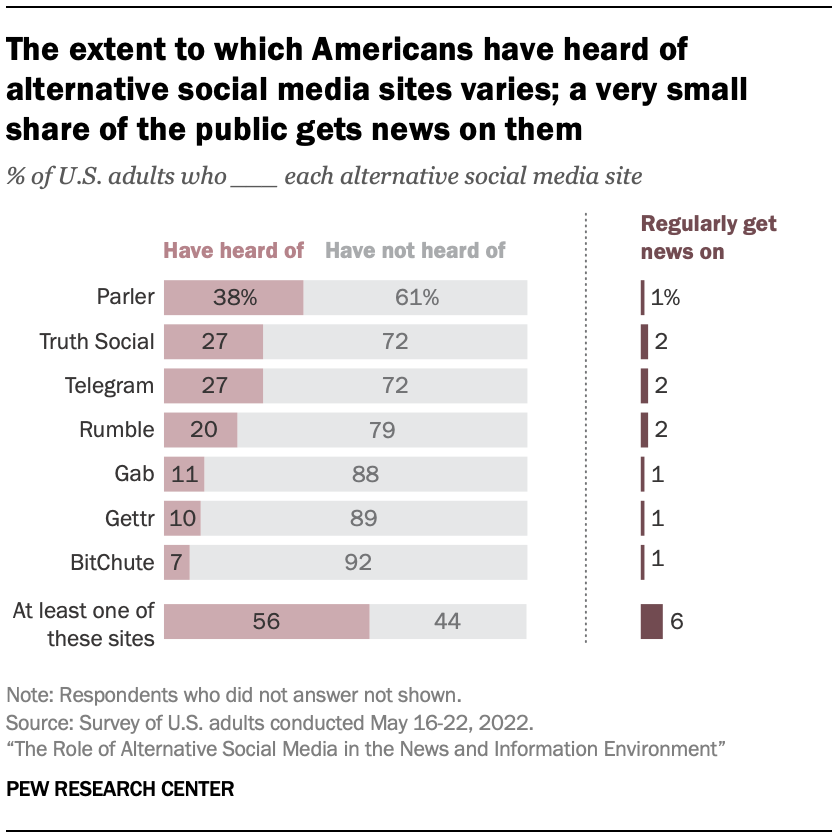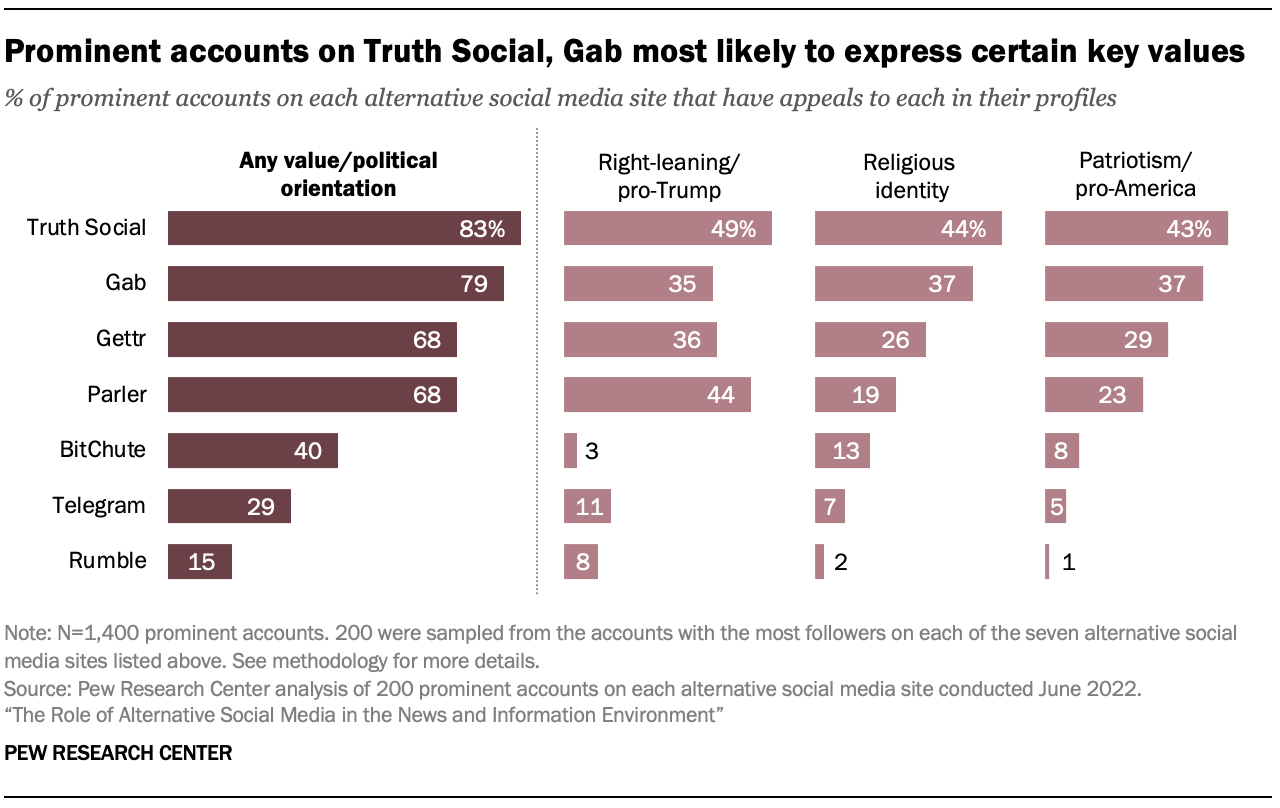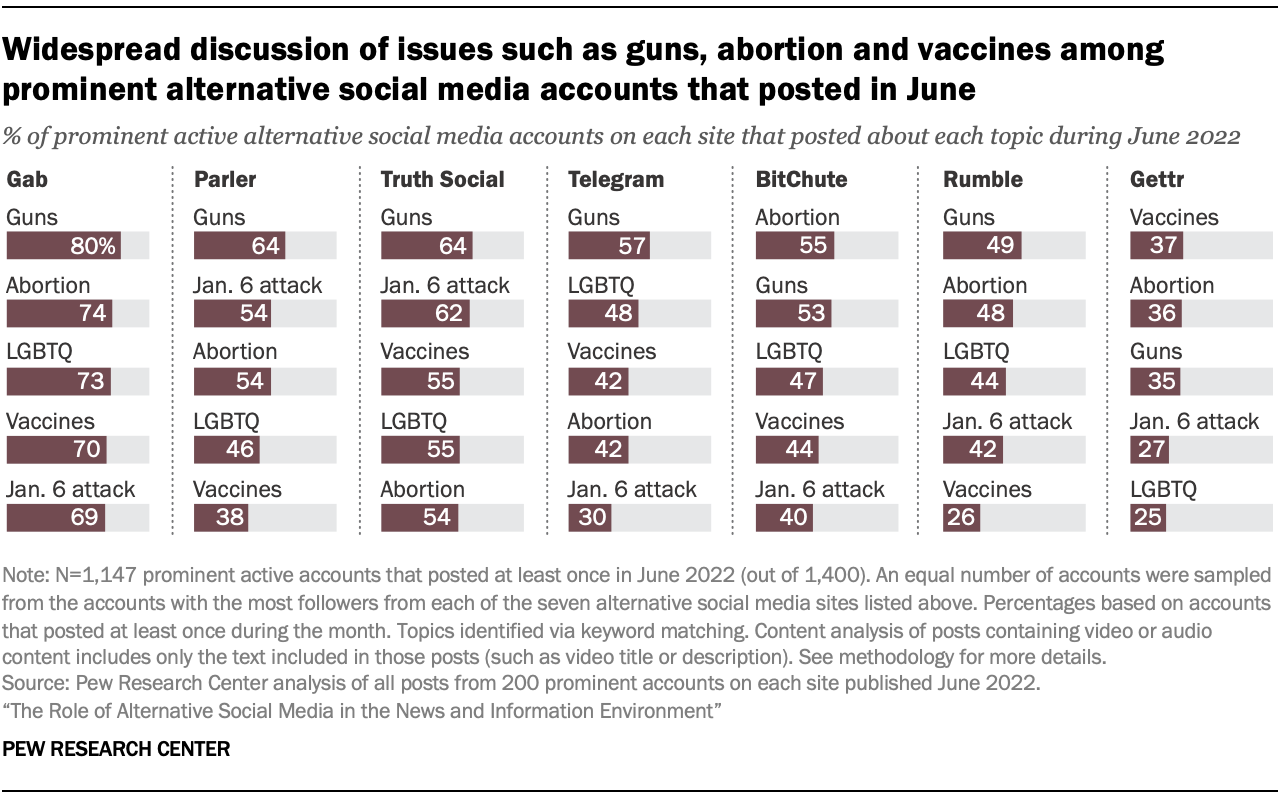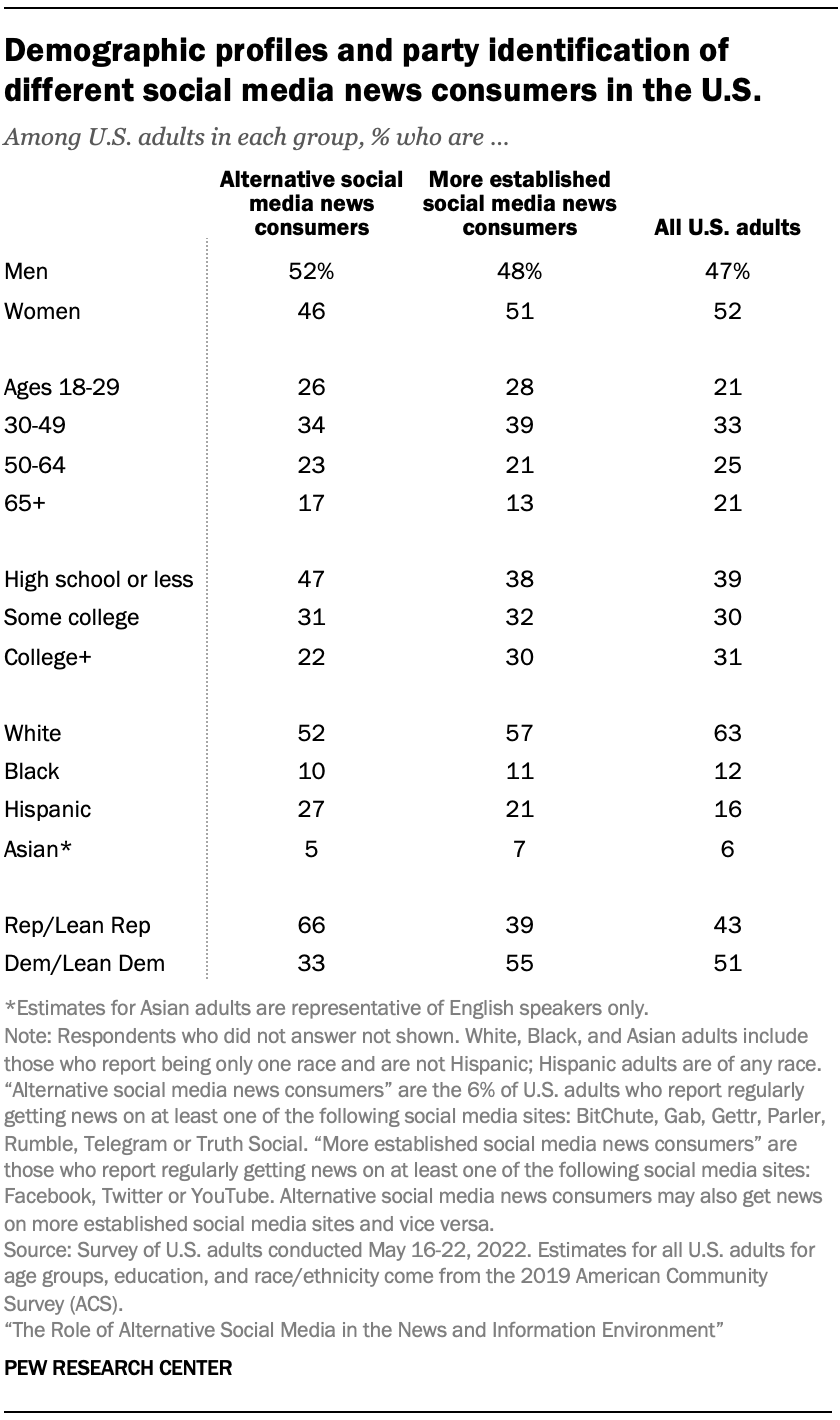
Gab, a social media site founded in 2016, is one of several platforms that bill themselves as alternatives to more established sites such as Facebook and Twitter. Gab has emphasized its commitment to free speech but has also faced criticism for hosting hateful content, including racist and antisemitic speech.
An October 2022 Pew Research Center study took a close look at Gab and six other alternative social media sites: BitChute, Gettr, Parler, Rumble, Telegram and Truth Social. These sites each have created small but generally satisfied communities of news consumers, according to the study.
Here are some key facts about Gab and its users, based on the Center’s research:
This Pew Research Center analysis provides data about the alternative social media site Gab. It is based on an October 2022 Center study that examined Gab and six other alternative social media sites – BitChute, Gettr, Parler, Rumble, Telegram and Truth Social – using a multi-method approach. Sites were included in the study if they had publicly accessible posts, were mentioned in news media, and had at least 500,000 unique visitors in December 2021.
The survey portion of the study was conducted May 16-22, 2022, among 10,188 U.S. adults. Everyone who completed the survey is a member of Pew Research Center’s American Trends Panel (ATP), an online survey panel that is recruited through national, random sampling of residential addresses. This way nearly all U.S. adults have a chance of selection. The survey is weighted to be representative of the U.S. adult population by gender, race, ethnicity, partisan affiliation, education and other categories. Read more about the ATP’s methodology here. Respondents were asked about their familiarity with each of the seven social media sites studied. Those who reported having heard of these sites were also asked whether they use the sites and get news there, how they feel about them, and more.
The margin of sampling error for the full sample of 10,188 respondents is plus or minus 1.6 percentage points; the margin of sampling error for the 587 alternative social media news consumers is plus or minus 7.0 percentage points.
The audit of alternative social media sites was initially conducted in April 2022. To conduct the analysis, a team of researchers were trained on a set of variables that examined features of each site like its privacy and moderation policies. Researchers reexamined each site from August to September 2022 (Gab was also rechecked in December 2022) and updated findings with any changes.
The account content analysis examines a sample of 200 prominent accounts on each of the seven sites included in this analysis, for a total of 1,400 examined accounts. Prominent accounts were sampled from the 5% of accounts with the highest number of followers on each site. A team of trained researchers analyzed these 1,400 sampled accounts to determine who runs the account, their political orientation, values and other characteristics. For more details on how accounts were identified and sampled, read the methodology.
The content analysis of posts examines the topics discussed and sources cited in 585,470 posts published in June 2022 by the 1,400 sampled accounts (only 1,147 of these accounts posted at least once that month). Researchers used a set of unique keywords to identify posts about five distinct topics – abortion; guns, gun control and shootings; the Jan. 6 attack on the U.S. Capitol; LGBTQ issues; and vaccines. Researchers looked at unique two- and three-word phrases that were commonly used in posts on each topic. Researchers then examined the unique domains linked to in these posts to identify the types of sources these accounts were using.
Here are the questions used in the study, detailed tables and the methodology.
Pew Research Center is a subsidiary of The Pew Charitable Trusts, its primary funder. This is the latest report in Pew Research Center’s ongoing investigation of the state of news, information and journalism in the digital age, a research program funded by The Pew Charitable Trusts, with generous support from the John S. and James L. Knight Foundation.

- About one-in-ten U.S. adults (11%) have heard of Gab, and 1% say that they get news there regularly. Overall, just 6% of Americans regularly get news from at least one of the seven sites studied, and no single site is used for news by more than 2% of U.S. adults. In comparison, many more Americans use more established social media sites for news, including Facebook (31%), YouTube (25%) and Twitter (14%).
- Gab identifies itself as an alternative to Big Tech and has limited content moderation. In a September 2022 audit of the seven sites studied by the Center, Gab was the only one for which researchers were unable to find an example of accounts or posts being removed for misinformation or offensive or harassing content. Gab CEO Andrew Torba has said as much in media interviews, rejecting the notion of taking down posts on his platform. Instead of moderating this content itself, Gab says individual users can control their own experiences. This includes allowing users to mute or block accounts they find offensive. This moderation policy has led several hosting and payment sites to suspend their relationships with the platform.
- About eight-in-ten prominent accounts on Gab reference some kind of value appeal or political orientation in their profiles. The Center’s October 2022 study examined 200 prominent accounts on Gab, selected from those with the most followers. As of June 2022, a majority of these accounts (79%) had values or other appeals in their profiles. For example, nearly four-in-ten (37%) had a reference to patriotism or a pro-American message, and the same percentage expressed some kind of religious identity. For both measures, these percentages were higher than the corresponding figures for most of the other alternative social media sites studied by the Center. Additionally, about a third of these 200 prominent accounts on Gab (35%) had a reference in their profiles to being right-leaning or supportive of former President Donald Trump.

- Guns, abortion and LGBTQ issues were among the subjects that prominent Gab accounts posted about in June 2022. A review of posts from these 200 prominent Gab accounts found that 80% posted about guns and gun rights in June 2022, 74% posted about abortion, 73% posted about LGBTQ issues, 70% discussed vaccines and 69% posted about the Jan. 6, 2021, attack on the U.S. Capitol. Discussion of each of these issues was more common among the prominent accounts on Gab than on any other site studied by the Center. (These posts came amid widespread discussion of several high-profile shootings and the Supreme Court’s decision to overturn Roe v. Wade, and at a time when a U.S. House committee was investigating the Jan. 6 riot. Vaccinations and LGBTQ issues were also regularly in the news.)


- About two-thirds (66%) of those who regularly get news from any of the seven alternative social media sites studied by the Center identify as Republicans or lean toward the Republican Party. This is far higher than the share who identify as Democrats or lean Democratic (33%). By comparison, those who get news on at least one of three more established social media sites studied by the Center – Facebook, Twitter and YouTube – are more likely to be Democrats or Democratic-leaning than Republican or Republican-leaning.
Note: Here are the questions used in the study, detailed tables and the methodology.




